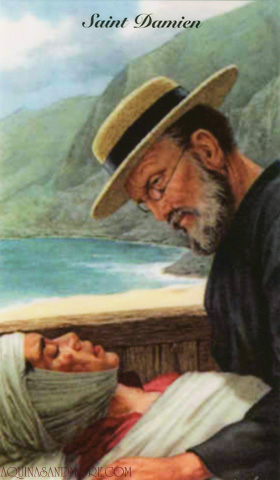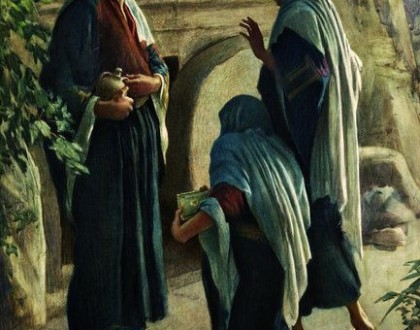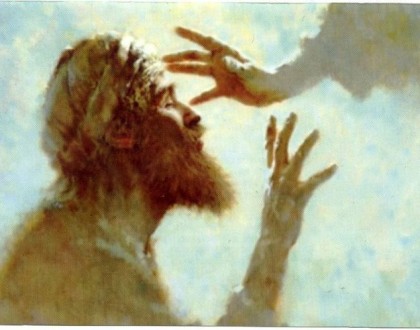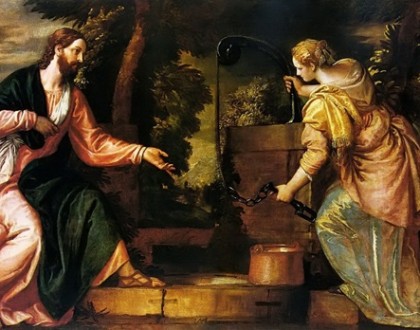6th Sunday in Ordinary Time, Year B – February 15, 2015

6th Sunday in Ordinary Time, Year B – February 15, 2015
The first reading for this Sunday outlines the harsh laws for people with skin diseases (Leviticus 13;1-2; 44-46). They were forced to live outside the community, separated from family and friends. Lepers suffered both from the physical disease but also ostracism from society. In the end both realities destroyed their lives.
Today’s gospel tells us of the leper who appears suddenly in front of Jesus, “begging” to be healed. By touching this outcast Jesus openly defied Levitical law. This leper has absolute faith in Jesus to heal him and by his faith challenges Jesus to heal him.
As we read the story of Jesus among the outcasts, let us recall with gratitude the life of a remarkable man who worked with lepers and dared to touch and embrace those who were afflicted with that debilitating disease.
Father Damien of Molokai, canonized as St. Damien in 2009, was born in Belgium in 1840. After a mission given by the Redemptorists he decided to join a religious order and joined the Fathers of the Sacred Hearts of Jesus and Mary and took the name Damien. He was sent on a mission to the Hawaiian Islands in 1864 and ordained a priest in Honolulu that same year. On the island of Molokai the Hawaiian government had set up a leper settlement in 1858. It was known as a living graveyard because there was no cure for the disease. Once people contracted the disease they were taken to the island by force and never again saw their family. There was no food brought to the island either, these poor sick lepers were supposed to fend for themselves even though as the disease progressed one lost nearly all one’s fingers and toes.
In 1873 at his own request and with the permission of the bishop, Fr. Damien decided to minister in Molokai as their resident priest. Fr. Damien knew that having served on the island he would never be allowed to leave the island due to the contagious nature of the disease. From the 600 lepers there at that time there was often more then one funeral every day. For a long time Fr. Damien was the only one to help them. Not only did he help them spiritually but in every other way also. He dressed their ulcers, helped them to erect cottages and he built many buildings himself; he dug the lepers’ graves and made their coffins. Fr. Damien was a thorn in the side of the government constantly begging on behalf of the lepers.
We are called to grow more and more from being selfish and self-centered to being a Fr. Damien type person.
Instead of funerals being a sad occasion on the island, Fr. Damien turned them into a happy occasion with processions, torch-bearers, music, bands and choirs. Fr. Damien taught the people their value in the eyes of God. Then when people came to the island they were given a royal welcome. In 1885, twelve years after he first began to minister on the island he noticed the first symptoms of the disease as he no longer felt hot water on his feet. He continued to help for as long as he could but he died three years later in 1888.
Pope John Paul II beatified him on June 4th 1995 saying, “he showed forth Christ’s tenderness and mercy for every human being, revealing the beauty of that person’s inner self which no illness, no deformity, no weakness can totally disfigure. He offered the lepers, who were condemned to a slow death [his very life]…; he became a leper among the lepers; he became a leper for the lepers. He suffered and died like them, believing that he would rise again in Christ, for Christ is Lord.” Now Fr. Damien is known as Saint Father Damien as he has been canonised.
Fr. Damien is a powerful example of Christian charity. He was more concerned about the well-being of the lepers than about himself. He helped to raise the lepers up from their misery.
We are called to grow more and more from being selfish and self-centered to being a Fr. Damien type person. This we can only do with the grace of God. With the help of God’s grace, we want to love our neighbour as ourselves as best we can.
Recent Sermons

Easter Sunday – The Resurrection
April 14, 2017

4th Sunday of Lent Year A – The Man Born Blind
March 27, 2017

3rd Sunday of Lent Year A – The Samaritan Woman at the Well
March 20, 2017


